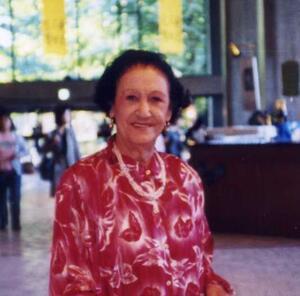Sulamif Messerer
Sulamif Messerer was an influential ballerina who taught a generation of dancers globally. Messerer trained at the Bolshoi school in Moscow, after achieving the Russian record for swimming at the first Soviet Olympiada in 1928. She left swimming in 1929 when she was promoted to prima ballerina in the Bolshoi Ballet Company. Messerer was one of the most sought-after teachers at the Bolshoi school, her dancers winning competitions and proceeding to remarkable careers. She began teaching worldwide, most notably in Japan where she is credited with laying the foundation for Japanese ballet. She also taught at the American Ballet Theater and Royal Ballet in London. In 2001 Messerer was the first Russian to be awarded the Order of the British Empire. She died in 2004.
Early Life and Family
Sulamif (Shulamith) Messerer was born in Moscow in 1908. The name Messerer is a Germanized version of the Hebrew Meshorer (poet). Her father Mikhail, a dentist, was born in 1867 in Dolginovo (Belarus, 84 km N of Minsk). He went to Vilna to study and there met and married Sima Shabad (Vilna 1873–Moscow 1929). In 1904 the family moved to Moscow. A scholar who taught Hebrew at Shneerson’s private gymnasium in Moscow, Mikhail spent many years compiling a Russian-Hebrew dictionary. The manuscript was confiscated during his arrest in 1919 at the height of the Civil War. He died in 1942.
The couple had eight surviving children: Azary [Azaryn—his stage name] (Vilna 1897–Moscow 1937) was a leading actor in the Moscow Art Theatre; Mattany (Vilna 1899–1957), a professor of economics, was arrested and spent eight years in a Siberian Gulag; Rakhil (Ra) Messerer Plisetskaya (Vilna, 1902–Moscow 1993) was a star of silent film. Her husband was arrested in 1937 and executed in 1938 during one of Stalin’s purges. They had two children, Maya Plisetskaya (b. 1925) and Azari (b. 1937). Rakhil was sent to a Gulag camp in Kazakhstan together with her infant son Azari who later became a famous dancer and choreographer. Her daughter Maya was adopted by Sulamif while Rakhil was in the Gulag. Maya called her aunt “Mita” during her childhood; it was Sulamif who took Maya to the Bolshoi to begin her career there.
Asaf (Vilna 1903–Moscow 1992) was one of the most important dancers and choreographers of the twentieth century. He began dancing as a soloist at the Bolshoi Ballet in 1921 and in 1922 began teaching there, continuing for seventy years, longer than any other teacher. Other Messerer children were Elizaveta (1906–1963); Sulamif (b. 1908); Emmanuil (1911–1941), an engineer; and Alexander (b. 1916), also an engineer. Indeed, the Messerer artistic dynasty became a legend.
Career at the Bolshoi
Sulamif Messerer, who trained at the Bolshoi school in Moscow, had been a swimming champion for four years, achieving the Russian record at the first Soviet Olympiada in 1928. However, she left swimming in 1929 when she was promoted to the rank of prima ballerina in the Bolshoi Ballet Company, a position she held for twenty-five years. There she often danced with her brother Asaf, who created the dances for their performances. In the 1930s Asaf and Sulamif Messerer jointly performed a production of their own creation which aroused enormous enthusiasm among Moscow audiences. In 1933 the two went on tour to Paris, Stockholm, and Berlin. While in Germany, they were able to visit relatives who were later killed by the Germans.
Sulamif Messerer’s most notable roles at the Bolshoi were the leads in Swan Lake (Odette/Odile), Don Quixote, and The Fountain of Bakhchisari. (Her niece Maya Plisetskaya, the daughter of Ra, also became a star at the Bolshoi and also danced this role.)
Later Career Teaching
Sulamif Messerer was first married to Boris Kuznetsov, a professor of economics. Her second husband was Grigori Levitin; their son Mikhail was born in 1948 in Moscow.
For at least twenty-five years Shulamif Messerer, who began teaching during World War II, was one of the most sought after teachers at the Bolshoi school, her dancers winning competitions and proceeding to remarkable careers. She began traveling to teach all over the world, most notably in Japan where she is credited with laying the foundation for Japanese ballet. There she staged more than twenty ballets and was awarded the country’s most prestigious award (the Order of the Sacred Treasure and the Golden Rays on the Banner).
Finding the atmosphere at the Bolshoi too stifling and wanting a better career for her son, the two defected from Russia via Japan in 1980 when Messerer was seventy-two years old. Thenceforth, persona non grata, she was removed from all the Russian encyclopedias and dance texts and, as a result, was often ignored in Western encyclopedias. In New York, she worked as a teacher and coach with the American Ballet Theater. In 1980 she was invited to teach at the Royal Ballet in London, which she did for twenty years. (Her son now also choreographs, directs, and teaches there.) She also continued teaching and staging ballets internationally including in Israel. Among Messerer’s students were the greatest ballet dancers of her time, including Rudolf Nureyev, Mikhail Baryshnikov, and British and French stars. In 2001 Shulamif was the first Russian ever to be awarded the Order of the British Empire. She died in London on June 3, 2004.
Messerer, Dr. Azary, in Valley Stream, New York, telephone interview, August 21, 2003.
Messerer, Azary. “Maya Plisetskaya.” In The International Encyclopedia of Dance, 202–206. Oxford: 1998.
Plisetskaya, Maya. I, Maya Plisetskaya. New Haven &.
London: 2001.



